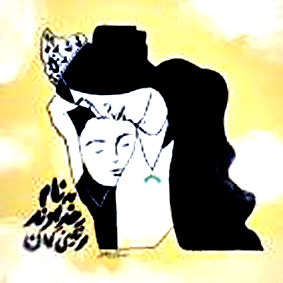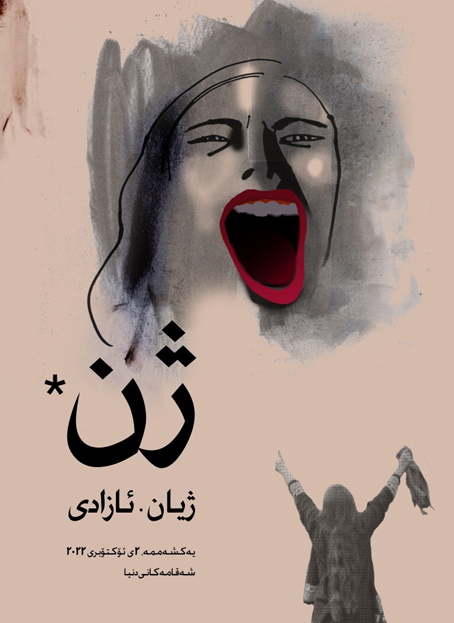|
CRY FREEDOM.net
formerly known as
Women's Liberation Front
MORE INSIGHT MORE LIFE
Welcome to cryfreedom.net,
formerly known as Womens
Liberation Front.
A website
that hopes to draw and keeps your attention for both the global 21th. century 3rd. feminist revolution as well
as especially for the Zan, Zendegi, Azadi uprising in Iran and the
struggles of our sisters in other parts of the Middle East. This online magazine
that started December 2019 will
be published every week. Thank you for your time and interest.
Gino d'Artali
indept investigative
journalist
radical feminist and women's rights activist
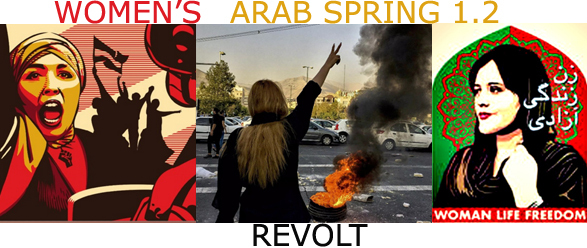
You are now at the
Iran 'Woman, Life, Freedom' section
For the 'Women's Arab Spring 1.2' Revolt
news
click here
|
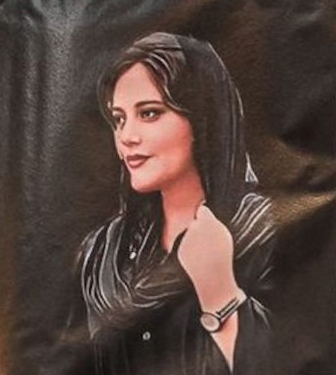
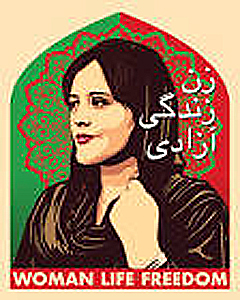
JINA MAHSA AMINI
The face of Iran's protests. Her life, her dreams
and her death.
In memory of Jina 'Mahsa' Amini, the cornerstone of the 'Zan.
Zendagi. Azadi revolution.
16 February 2023 | By Gino d'Artali
And also
Read all about the assasination of the 22 year young
Jina Mahsa Amini (Kurdistan-Iran) and the start of the Zan,
Zendegi, Azadi (Women, life, freedom) revolution in Iran
2022
and the latest news about the 'Women Live Freedom' Revolution per month in
2024:
Jan wk2 part2 --
Jan wk 2 --
Jan wk 1-2-part2 --
Jan wk 1-2
and 2023:
Dec wk 5 part 2 -- Dec wk 5
--
Dec
week 4-3 --
Dec wk3
--
Dec 17 - 10
--
Dec week 2 and 1
--
click here for a menu overview November - Januari
2023
And
For all topics below
that may hopefully interest you click on the
image:
|
'THE NO-HIJABIS
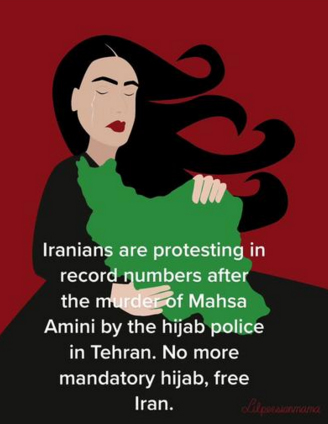
Updated December 28, 2023 |
'BIOLOGICAL
TERROR ATTACKS
AGAINST SCHOOLGIRLS'
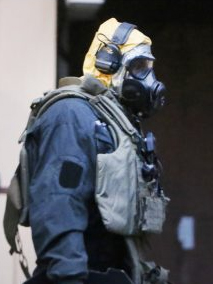
Updated October 10, 2023 |
'IRANIAN JOURNALISTS
UNDER SIEGE'

Updated December 22, 2023 |
'BLINDING
AS A WEAPON'
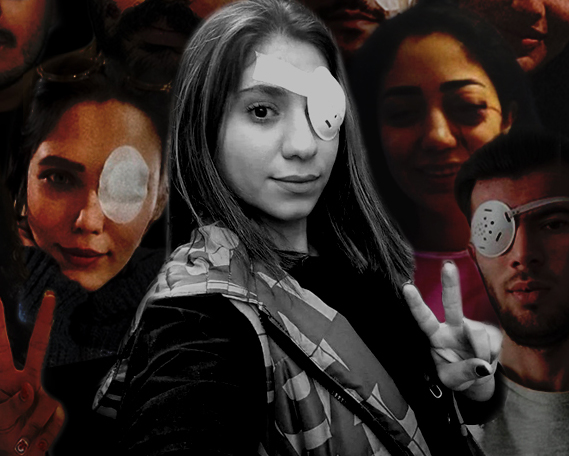
Updated January 3, 2024 |
'THE HANGING SPREE'
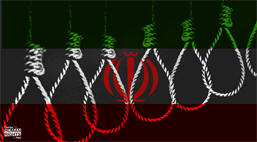
Updated Januari 3, 2024
|
CLICK HERE ON HOW TO READ
ALL ON THIS PAGE
|
Here we are to enter THE IRANIAN
WOMEN'S REVOLUTIONISTS against
the supreme leader, the arch-reactionary Ayatollah Ali Khamenei,
and his placeman president, Ebrahim Raisi. The message of
the women when he visited a university is plain: <give way or
get lost> in 2023.
IN MEMORY OF ASRA PANAHI (16)- JHINA MAHSA AMINI (22) - NIKA SHAKARAMI (16), SARINA ESMAILZADEH (16) HADIS NAJAFI (20), AND MORE WOMEN WHO WERE ASSASINATED SO
FAR BY THE IRANIAN AXIS OF EVIL.
Click here for a total list so far
'Facing Faces and
Facts 1-2' (2022) to commemorate the above named and more and food for
thought and inspiration to fight on.
and 'Facing Faces & Facts 3' edited
December 2022/March 2023
Dear reader, from here on the 'Woman,
Life, Freedom' pages menu will look a bit different and this
to avoid too many pop-ups ,meaning the underlined period
in yellow tells you in what period you are and click on another
underlinded period to go there. However, when needed a certain
topic will be in yellow meaning it's a link to go that topic and
will open in a new window. If you dissagree about any change feel more than free to let me know what you
think at
info@cryfreedom.net
This does not count for the above topics which, when
clicked on, will still appear in a pop-up window and for now the
'old' lay-out 'till I worked that all out. Thank you. Gino
d'Artali
(Update January 12, 2024)
|
When one hurts or kills a women
one hurts or kills hummanity and is an antrocitie.
Gino d'Artali
and: My mother (1931-1997) always said to me <Mi
figlio, non esistono notizie <vecchie> perche puoi imparare qualcosa da
qualsiasi notizia.> Translated: <My son, there is no such thing as so
called 'old' news because you can learn something from any news.>
Gianna d'Artali.
UPDATE January 9, 2024
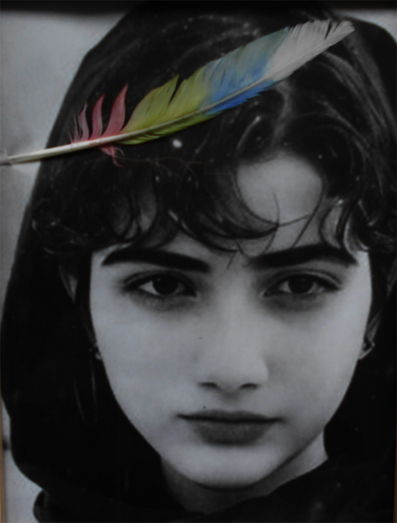
To honor our dear sister Armita Gevarnand I humbly made the above
artwork. Allah has her soul. May she rest in peace.

Hijab enforcer = HARAM!!
PIC Armita Gevarnand's hijab enforcer
Iranwire - 9 Jan 2024
<<Children Used as Hijab Enforcers in Tehran Metro
Authorities in Tehran are using children to enforce mandatory headscarf
rules for women in the city's metro stations, IranWire has learned. The
information was confirmed by Ali Shafakhah, the head of the Skoda
Children's Rights Committee, who said that <the authorities have now
hired children as hijab enforcers.> Shafakhah wrote on the social media
platform X that he had previously sent a letter to Tehran's mayor to
raise concern about the plight of <tens of thousands> of child laborers
in the capital. The Islamic Republic has a track record of using
children as security forces or soldiers, and for ideological purposes.
As many as 24 students were among dozens of people killed in a January 3
bombing attack on a memorial ceremony in Kerman for Qasem Soleimani, a
top general who died in a US drone strike in Iraq four years ago. Some
of the students were said to have been brought to the ceremony, without
their parents, through a camp called <Pilgrim to Paradise.> Children in
Iran have also been involved in <Hijab and Chasity> gatherings. During
the Woman, Life, Freedom protests that erupted across Iran in 2022,
images depicting children among the security forces were shared on
social media. In contravention to international standards and the UN
Convention on the Rights of the Child, to which Iran is a signatory, the
paramilitary Basij force and other organizations continue to involve
children in military training programs .>>
Source:
https://iranwire.com/en/news/124165-children-used-as-hijab-enforcers-in-tehran-metro/
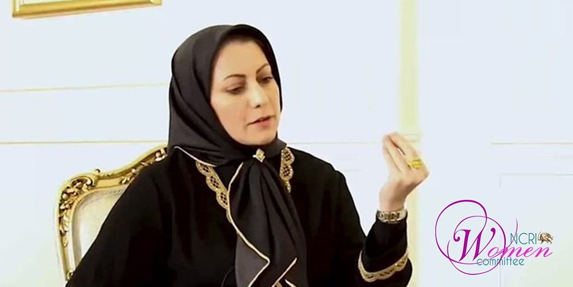
Sara Massoumi
NCRI - Womens committee - 22 Dec 2023 - in Women's News
<<Journalist Sara Massoumi sentenced to 6 months for a tweet
Journalist Sara Massoumi was sentenced to six months imprisonment by the
26th Branch of the Revolutionary Court of Tehran. She was also barred
from journalistic activities for two years. Ms. Massoumi must also pay a
fine of 15 million Toumans in cash. The semi-official Sharq newspaper
cited Ali Mojtahedzadeh, Sara Massoumi's lawyer, as saying, <The hearing
convened at the 26th Branch of the Revolutionary Court examined the
charge of 'publishing context contrary to the truth.' > The charge
refers to a tweet about Armita Geravand, the teenage girl who died after
being attacked in a metro train by a Hijab Patrol.
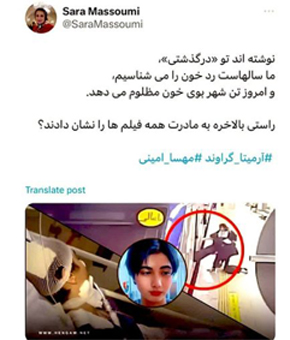
Sara Massoumi's tweet
The tweet reads, <They wrote you passed away. For years, we have known
the trace of blood and today, the city smells of the blood of the
innocent. By the way, did they show all the footage to your mother?>
<The tweet, however, did not contain any news and therefore could not be
contrary to the truth. The Judge's verdict also refers to the report of
law enforcement agents, but we did not see any reports,> Mr.
Mojtahedzadeh said. Sara Massoumi's lawyer noted that <if a journalist
is to endure such imprisonment for just one tweet, then we cannot
essentially talk about freedom of speech in this country.> (The
state-run Sharq daily, December 20, 2023)>>
Source:
https://women.ncr-iran.org/2023/12/22/journalist-sara-massoumi/
Iranwire - 20 Dec 2023
<<Iranian Journalist Masoumi Handed Prison Term over Tweet
Iranian authorities have sentenced journalist Sara Masoumi to six months
in prison and a two-year ban from practicing journalism for <publishing
false information.> The sentence was issued by Branch 26 of the
Revolutionary Court on December 20, Masoumi's legal representative, Ali
Mojtahedzadeh, told the Shargh newspaper. Mojtahedzadeh said that the
accusations against his client included <publishing a tweet about Armita
Geravand,> a 16-year-old girl who died in October after being assaulted
at a Tehran metro station for not wearing a mandatory headscarf. <Unlike
many journalists whose cases were transferred to the prosecutor's office
after the death of Armita Geravand, Masoumi's case was referred directly
to the Revolutionary Court,> Mojtahedzadeh said. Maryam Shokrani,
Shargh's economic editor, and Milad Alavi, a reporter at the same
newspaper, faced summons for publishing or republishing news from
domestic media concerning Geravand. According to the Committee to
Protect Journalists, a media freedom NGO, Iranian authorities have
arrested at least 95 journalists since September 2022, when the death in
police custody of 22-year-old Mahsa Amini sparked nationwide protests.>>
Source:
https://iranwire.com/en/journalism-is-not-a-crime/123726-iranian-journalist-masoumi-handed-prison-term-over-tweet/
Iranwire - 7 Dec 2023
<<40th Day After Teenage Girl’s Death Marked in Tehran Amid Tight
Security
A ceremony marking the 40th day since the death of 16-year-old Armita
Geravand was held at Tehran's Behesht Zahra cemetery on December 6 amid
heavy security presence. After the ceremony, authorities apprehended a
Tehran resident named Ariana Akbari and took him to an undisclosed
location. Akbari had previously been detained during nationwide protests
that rocked Iran last year. Armita fell unconscious on the platform of a
Tehran metro station on October 1 after being assaulted for not wearing
a mandatory headscarf. She was taken to a hospital where she remained in
a coma for 28 days. Anti-government chants could be heard across Tehran,
Karaj, Shiraz and other Iranian cities on the evening of her death.
During Armita's October 29 burial, authorities assaulted mourners and
arrested dozens of people, including prominent human rights lawyer
Nasrin Sotoudeh. Security forces have prevented the Geravand family and
friends from speaking to the media, while journalists have faced
reprisals for reporting on the teenager's situation.>>
Source:
https://iranwire.com/en/news/123283-40th-day-after-teenage-girls-death-marked-in-tehran-amid-tight-security/

NO-hijabis
NCRI - Womens committee - in Monthlies -
in Women's news - 1 Dec 2023
<<November 2023 Report: Hijab and Chastity Law
The Most Prevalent Form of Violence Against Women and Girls in Iran:
Enforcing the Compulsory Hijab and the New Hijab and Chastity Law
Coinciding with the 16 days of activism to eliminate violence against
women and girls, the November monthly report focuses on the most
prevalent form of violence against women in Iran. While other forms of
violence affect specific strata of women and girls, activists and
dissidents, students, etc., the violence entwined with enforcement of
the compulsory veil impacts all women from all ages, all walks of life,
and in every city and village across the country. Those who violate this
mandatory dress code are subjected to violence by Hijab patrols.
Inflicting this form of violence against Iranian women is both
sanctioned by the state and institutionalized in the law. As Iranian
women and girls increasingly resist the mandatory imposition of the
veil, the regime's agents have escalated their brutality in enforcing
this practice to unprecedented levels. Last year, Zhina (Mahsa) Amini
was killed due to the brutality of guidance patrols who violently
arrested and transferred her to a Morality Police detention center.
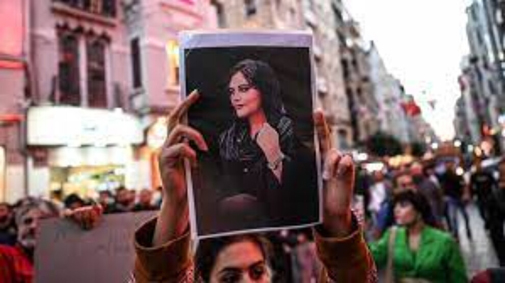
Jina Amini
This year, Hijab monitors assaulted a 17-year-old student, Armita
Geravand, inside a metro train, which led to her death.
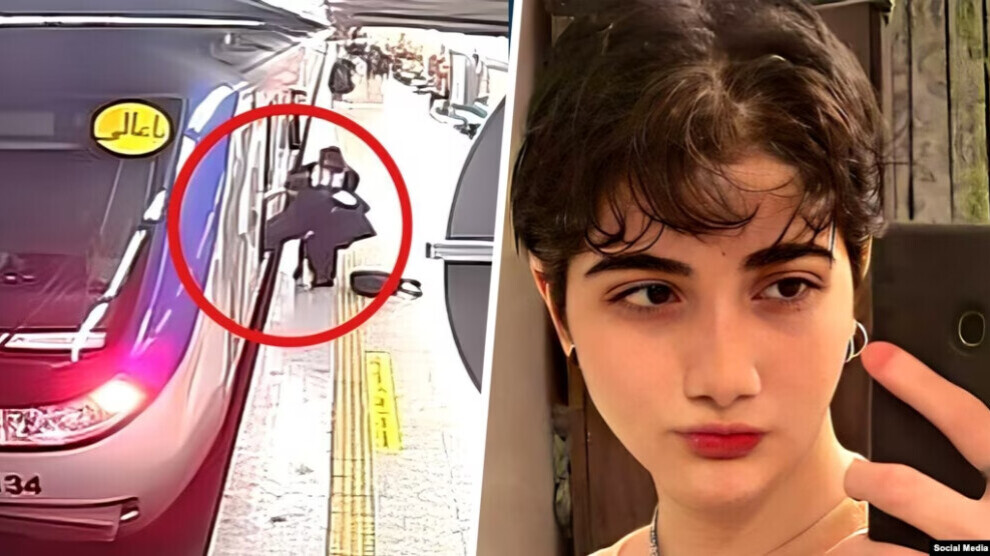
Armita assault
The regime's security and intelligence forces were highly vigilant and
took control of the situation early on, to prevent the outbreak of
another nationwide protest over the death of this innocent girl. The
Iranian regime presents a paradox: it thrives on the suppression of
women, evident in its stringent enforcement of the compulsory veil, yet
faces widespread opposition from the majority of Iranian women who seek
autonomy in their attire choices. By intensifying the enforcement of the
Hijab despite this resistance, the regime risks triggering a formidable
uprising-an outcome it greatly fears, as it could swiftly spiral beyond
its control. In this edition of the NCRI Women's Committee's monthly
reports, we'll delve into the implications of the regime's new Hijab and
Chastity Law on Iranian women and society at large. As we are publishing
this report, it has been reported that the Governorate of Qom has issued
a directive, instructing female government employees to attend work with
the head-to-toe black chador and without any make-up. (The state-run
didbaniran.ir, December 2, 2023)
How Was the New Hijab and Chastity Law Adopted?
On May 24, the Iranian state media published the text of the <Protection
of Hijab and Chastity> Bill comprised of 15 articles. This was the bill
proposed by the Iranian Judiciary and delivered to Raisi's government.
On June 8, the government finished making minor changes and passed the
bill renamed, <Supporting Hijab and Chastity> to the parliament for
double-priority adoption. However, the parliament saw flaws in the bill
as it only dealt with penalties. Therefore, the parliament passed the
bill to the Legal Commission for examination. On July 27, the Iranian
state media published the text of the bill finalized in 70 articles by
the parliamentary commission. On August 6, the parliament announced
receipt of <The Bill to Support the Family through the Promotion of the
Culture of Hijab and Chastity> for deliberations. Fearing public
reactions, the clerical regime’s parliament refrained from debating the
bill in its open session and invoked Article 85 of the constitution
which permits the formation of a committee to approve legislation for
<experimental> implementation. The Legal Commission concluded its
deliberations on August 20, and the clerical regime's parliament adopted
the new Hijab bill in an open session on September 20, 2023. One hundred
and fifty-two (152) members of the parliament voted in favor, 34
against, and seven abstained. The new bill will be enforced for three
years on a trial basis after being approved by the Guardian Council.
On October 24 and November 25, 2023, the Guardian Council returned the
bill to the parliament to resolve the shortcomings and ambiguities in
the bill. Therefore, the bill is not yet officially passed into law
until approved by the Guardian Council.
The Bill to Support the Family through the Promotion of the Culture of
Hijab and Chastity
According to mullah Moussa Ghazanfarabadi, the chair of the
parliamentary Legal Commission, <The bill has five chapters. The first
chapter deals with generalities; the second chapter defines the general
duties of executive organs. The third chapter defines the special
obligations of executive agencies like the national radio and television
and the Ministry of Culture and Islamic Guidance. The fourth chapter
outlines the general duties and social responsibilities, and the fifth
chapter outlines the crimes and offenses.> As it is evident from the
name of the bill, the restrictions imposed on women's freedom of choice
regarding their attire are justified under the pretext of protecting the
foundations of the family. In Chapter One, Article 1 of this bill
states, <Family is the main center for growth and progress of human
beings and their calm. Therefore, any behavior that promotes 'nudity,' 'unchastity,'
'removal of hijab,' 'malveiling,' and actions against public chastity,
which would lead to the disruption of the calm of the woman and the man
in the family, promotion of late marriages, spread of divorce and social
ills, and devaluation of family violate paragraphs 1 and 7 of the
Constitution, and are banned according to the rulings of this law and
others.> In Chapter Two, this law obliges all government agencies to
hold educational terms for their staff and teach them the <style of
Islamic life based on the couple's commitment to each other and
promotion of the culture of Hijab and Chastity.> The banner posted at
the entrance of a hospital in Lahijan: Entry of all individuals, who
break the norms and are improperly veiled, is forbidden. The hospital is
not allowed to provide services to improperly veiled individuals and
those who break the norms.
Enforcing the Compulsory Hijab and the New Hijab and Chastity Law
In Chapter Three, the law obliges more than 30 government ministries and
organizations to carry out a long list of duties with regards to
implementation of this law. They include the Ministry of Culture and
Islamic Guidance, the Organization of State Radio and Television, the
Organization of Islamic Propaganda, the Ministry of Education, Ministry
of Science, Research, and Technology, the Ministry of Health and Medical
Education, the presidential directorate of Science, Technology, and
Economy, the Ministry of Interior, the Interior Ministry's HQ for
Coordination and Leading the Implementation of the Hijab and Chastity
Law, the municipalities and city councils throughout the country, the
National Welfare Organization, the Ministry of Sports and Youths, the
Ministry of Industries, Mines, and Commerce, the Ministry of Roads and
Urban Development, the Ministry of Communication and Information
Technology, the Ministry of Cultural Heritage, Tourism and Handicraft,
the Ministry of Intelligence, the IRGC Intelligence, the State Security
Force’s Intelligence Organization, the Planning and Budget Organization,
the Administrative and Employment Organization, the presidential
directorate on Women and Family Affairs, the State Security Force
Command, the Judiciary Branch, the paramilitary Basij, and the
Headquarters to Promote Virtue and Forbid Evil. Each of these ministries
and organizations has between 2 to 13 duties listed for them to educate
their staff and the society at large about the Islamic style of life and
promote the culture of hijab and chastity. Such duties include
segregation of the workspace in offices and even in hospitals, enforcing
the regime's compulsory dress code in schools, offices, universities,
hospitals, etc., and refraining from employing or providing services to
individuals who do not observe the dress code. Ironically, the Ministry
of Intelligence, the IRGC Intelligence, and the SSF Intelligence are all
involved in imposing the compulsory veil on Iranian women and girls. In
Chapter Four, entitled, <General Obligations and Social Responsibility,>
Article 34 underlines that the recruitment, deployment, employment,
promotion, ranking, appointment, etc. of individuals are conditional on
their adherence in practice to Hijab and Chastity. In Chapter Five, 33
articles are devoted to the harsh punishments and heavy financial fines
handed down for those who choose to violate the Hijab and Chastity Law,
including in cyberspace and social media. Business owners are obliged to
control their employees' observance of the veil.
More than 2,850 Hijab Monitors Recruited in Tehran's Metro Stations
Even before the approval of the bill by the mullahs' legislative
hierarchy, the Iranian regime took measures to implement the strict
rules outlined in the new Hijab and Chastity bill. One of the
semi-official dailies in Iran published the cliche of a highly
confidential document by the Ministry of Interior, which indicated the
presence of 2,850 Hijab Monitors or Hijab patrols in the metro stations.
(The state-run Etemad daily newspaper, November 26, 2023)
The directive dated, May 30, 2023, addresses some of the government
agencies, including Tehran's Municipality, and the Metro Company of the
Capital, and states, <Entry of individuals who remove their Hijab to
government-run places is conditional on their observance of the legal
dress code.> The official IRNA news agency carried an interview with the
Secretary of the Staff of Promotion of Virtue and Prohibition of Evil,
on November 25, 2023. Mohammad Hossein Taheri Akordi told IRNA that
Hijab Monitors are <Jihadi forces.> He said there are more than 2,850
Hijab Monitors in Tehran whose activities are the product of
“coordination among the IRGC, Bassij, State Security Force (SSF),
Tehran's Municipality, and the Prosecutor’s Office.> Taheri Akordi said
the mandate of these Hijab Monitors is to give <verbal warnings.> He
said they work voluntarily and without receiving any salaries. However,
it was reported in August that Tehran's municipality had hired 400 Hijab
patrols to be deployed in metro stations, with a monthly salary of 12
million Tomans. Their duty is to give warnings to the passengers and
prevent them from getting on the metro wagons without covering their
hair. They will also hand over the women with improper veiling or no
veil to the police. (The state-run Rouydad24.ir, August 6, 2023) IRNA
cited Ahmad Vahidi, the Interior Minister, as saying, <Verbal promotion
of virtue and forbidding of evil is a general duty. It is publicly and
legally sanctioned and does not require any licenses.> He added, <The
Ministry of Interior supports those who promote virtue and forbid from
evil before the law.> (The official IRNA news agency, November 25, 2023)
Hijab and chastity The new academic year in Iran sees strict clothing
restrictions for female students
Strict clothing restrictions for female university students
The new academic year saw stepped-up pressure and restrictions on
Iranian students, and more arrests and suspensions. Simultaneous with
the new academic year and the opening of schools, the parliament's
approval of the new Hijab and Chastity Bill for a three-year trial
period created a strict atmosphere in the universities. Social media
posts showed images of camouflaged vehicles on parade inside Tehran
University while playing anthems from the Iran-Iraq wartime. Similar
reports emerged from Amir Kabir, Al-Zahra, Allameh Tabatabaii, and
Kharazmi universities in Tehran and Isfahan's University of Art. The
Medical School of Kerman also posted a banner on the regulations for the
clothing of its students. In the University of Shiraz, the authorities
installed facial recognition technology in the university's restaurants.
The Shiraz University management spent 700 million Tomans to install
this technology and identify the students who breach the clothing
regulations. More recently, in a shocking incident on November 20, 2023,
at Melli University, masked security forces raided the library,
psychology classrooms, and classes in the School of Literature and the
School of Human Sciences, confiscating the student ID cards of female
students who were not wearing the hijab. Students in this and other
universities in Tehran went on a two-day protest strike and refused to
attend their classes.
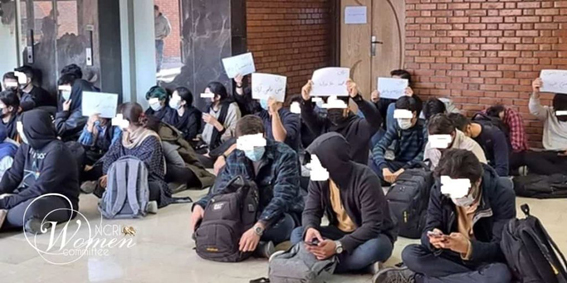
Students strike at Sharif University of Technology
Punitive Measures for Violating Compulsory Hijab
Iranian women received harsh penalties, including termination from their
jobs, being assigned to wash corpses in the morgue, and being forced to
do janitorial work or attend psychiatric sessions for supposed <mental
disorders> for failing to adhere to the compulsory dress code. The
Reuters news agency released footage showing a woman in Tehran's Gisha
district crying out for help after being harassed and assaulted by a
woman agent of the state security forces, who attempted to violently
arrest her and take her into a van.
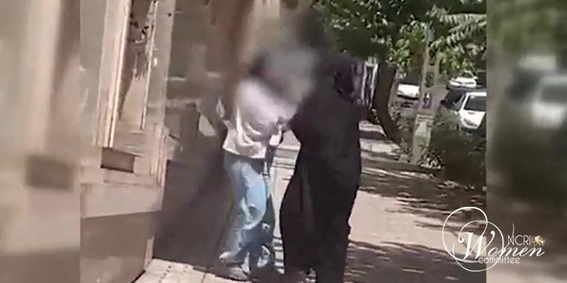
Picture by Reuters
Hijab and Chastity punishments against women defying the compulsory
Hijab
International Censure of the New Hijab and Chastity Bill
The Office of the High Commissioner for Human Rights issued a statement,
on September 1, 2023, in which a group of UN Human Rights
Council-appointed experts slammed Iran's draft Hijab law. The experts
said the bill could amount to <Gender Apartheid.> They expressed concern
that the new Hijab law in Iran sanctions new punishments for women and
girls who fail to wear the headscarf, or hijab, in public. <The draft
law could be described as a form of gender apartheid, as authorities
appear to be governing through systemic discrimination with the
intention of suppressing women and girls into total submission,> the UN
human rights experts said. They reiterated that the proposed
parliamentary Bill to Support the Family by Promoting the Culture of
Hijab and Chastity and existing restrictions are inherently
discriminatory and may amount to gender persecution.
<The draft law imposes severe punishments on women and girls for
non-compliance which may lead to its violent enforcement,> the experts
warned and added that the new hijab law would <disproportionately affect
economically marginalized women.> The experts urged the Iranian
authorities to <reconsider the compulsory hijab legislation in
compliance with international human rights law, and to ensure the full
enjoyment of human rights for all women and girls in Iran.> Amnesty
International called on the Iranian authorities to <abolish compulsory
veiling, quash all convictions and sentences for defying compulsory
veiling, drop all charges against all those facing prosecution, and
unconditionally release anyone in detention for defying compulsory
veiling. The authorities must abandon plans to punish women and girls
for exercising their rights to equality, privacy, and freedom of
expression, religion, and belief.> On November 3, 2023, the UN Human
Rights Committee issued its findings on the Islamic Republic of Iran.
The Committee was disturbed by legal provisions that continue to
discriminate against women and girls, particularly the <Support the
Family by Promoting the Culture of Chastity and Hijab Bill,> which
imposes severe punishments on women and girls for violations of the
mandatory dress code, including up to ten years in prison and flogging.
It was also concerned about the redeployment of morality police to
monitor the dress code in public. It urged the State Party to reform or
repeal laws and policies that criminalize non-compliance with compulsory
veiling, specifically the <Bill to Support the Family by Promoting the
Culture of Hijab and Chastity>. It also asked the State party to disband
the morality police.>>
Source:
https://women.ncr-iran.org/2023/12/02/hijab-and-chastity-law/
---
Iranwire - 27 Nov 2023 - by SOLMAZ EIKDAR
<<Tehran Hijab Enforcer: <I Need This Job to Feed My Children>
Zeinab, a single mother of three, is among women in Tehran who dedicate
eight hours a day to safeguarding <chastity of society.> Ismail, a
resident of northern Tehran, spends his evenings patrolling the streets
of northern Tehran to record the license plate numbers of vehicles in
which women are not wearing the mandatory hijab. These individuals are
referred to as <hijab enforcers> by Islamic Republic officials. Zeinab
and other women from her neighborhood underwent several training
sessions before embarking in July on her mission to warn women with
uncovered hair. She is part of a network responsible for <photographing
and documenting> non-compliant individuals. Interior Minister Ahmad
Vahidi denied issuing permits to individuals involved in the <Promotion
of Virtue and the Prevention of Vice,> claiming their engagement was
"spontaneous.> And on November 24, he acknowledged that such an activity
is a public duty. Two days later, Etemad newspaper revealed a
confidential document showing that hijab enforcers are organized under
Vahidi's supervision to <suppress> women. In an interview with IranWire,
Zeinab explains that she was forced to fend for her two daughters and
her son alone after her husband abandoned the family. Desperate to make
ends meet, she responded to a job opportunity suggested to her by a
woman she worked for as a home cleaner. This job, described as a mission
to safeguard <the chastity of society,> offered a prospect of financial
security, with a monthly income and material benefits worth
approximately 13 million tomans ($260). Days after the woman introduced
Zeinab to her husband, she was invited to participate in preparatory
classes to become a hijab enforcer. The classes began with lectures on
hijab, described as a divine obligation, and the principles of the
<Promotion of Virtue and the Prevention of Vice.> Subsequent sessions
focused on practical aspects of the job, emphasizing the importance of
maintaining a group presence, avoiding confrontation with women who do
not adhere to the strict dress code, and utilizing photography to
document instances of non-compliance. Zeinab and her fellow hijab
enforcers then embarked on eight-hour patrols across Tehran, reminding
women to cover their hair appropriately. <We only warn,> Zainab says.
<We say, 'My lady, my dear, your hijab, scarf, or shawl.'> Each group of
hijab enforcers typically consist of eight women accompanied by several
men. The men largely remain on the sidelines, but when a conflict arises
between enforcers and defiant women they step in to support the female
enforcers. Zeinab acknowledges that occasional clashes occur during her
patrols. <We have been told that if we harm someone, we must be held
accountable, and the headquarters will deny any connection with us,> she
explains. <From the very first day, they said that if we hit someone, we
would be responsible for it.> <I won't get involved in any conflicts
because I need this job to feed my children. If something happens, no
one would give a piece of bread to my children,> the woman adds. Ismail
tells IranWire that he works for eight to 10 hours daily in a poultry
farm in Shahriar, near Tehran. After this job, he commutes to the
capital, where he monitors and reports license plates of vehicles
carrying women without head covering. Ismail says he has received a
<monitoring software> from the local paramilitary Basij force to
identify cars with <bareheaded women.> For over four months, he has
reported instances of "hijab violations" in the north of Tehran five
days a week. <The rich people in the north of Tehran are the agents of
the West, the Israeli and American staff, trampling on the blood of my
martyred father and people like me,> he says.
Ismail's father died in the Iran-Iraq war in the 1980s.
The man, who claims not to receive any money for his work, expresses
frustration about being limited to reporting 40 cars every 24 hours.
<Some days it takes me two hours to reach Niavaran neighborhood and half
an hour to record the plate numbers of 40 cars. I input them into the
software and then I have to go back.> Ismail acknowledges that despite
the intensifying crackdown on women without head covering, their number
has not decreased. He attributes this to the judiciary's lack of
decisive action and the constraints put on the Basij force. <If they had
left us, we would have put a scarf and a chador on women's heads; it
only takes a little determination and force,> he says.>>
Source:
https://iranwire.com/en/women/122925-tehran-hijab-enforcer-i-need-this-job-to-feed-my-children/
Opinion by Gino d'Artali: I do understand the people needing a job but
what they earn is 'bloodmoney' really because it will not bring back our
dear sister Armita Gevarnand, Jina Amini and all the other sisters who
were killed by the mullahs' regime or its shia followers/murderers!
Iranwire - 22 Nov 2023
<<Iranian Journalist Shokrani Faces New Legal Case
Maryam Shokrani, the economic editor of Iran's Shargh newspaper, has
announced that a new legal case was filed against her. Shokrani said on
Instagram on November 22 that the case was referred to Branch 1058 of
the Culture and Media Prosecutor's Office <without investigation.> The
journalist also said she hadn't been given a chance to present her
defense. This is the second case filed against Shokrani in recent weeks.
Shokrani announced earlier she had been summoned to Branch 16 of the
Tehran Culture and Media Prosecutor's Office, adding that she was
unaware of the complaint's subject matter. The cases were opened against
Shokrani amid a wider crackdown on journalists who have reported on the
death of Armita Geravand, a 16-year-old girl who was assaulted at a
Tehran metro station on October 1 for not wearing a headscarf. Armita
died after being in a coma for 28 days. Several other journalists have
also been summoned or arrested for their coverage of her death. They
include Sara Masoumi, Milad Alavi, and Omid Tosheh. Negar Ostad Agha, a
member of Etimad Online's editorial team, has been arrested for
attending Geravand's funeral.>>
Source:
https://iranwire.com/en/journalism-is-not-a-crime/122767-iranian-journalist-shokrani-faces-new-legal-case/
Iranwire - 22 Nov 2023
<<Iranian Activist Ronaghi Faces New Charges
Former political prisoner and civil activist Hossein Ronaghi says he has
been summoned by the Iranian judiciary to face new accusations. On
November 21, Ronaghi posted an image of the summons on the social media
platform X, accompanied by a caption stating: <I have been summoned to
Branch 1 of the Evin Prosecutor's Office regarding new charges and a new
case.> <We are unaware of the specifics of the accusation or the new
case, but I will go to the prosecutor's office in the coming days. It is
likely that the new case is related to my statements regarding the
killing of Armita Geravand,> he added. Armita is a 16-year-old girl who
was assaulted at a Tehran metro station on October 1 for not wearing a
headscarf. She died after being in a coma for 28 days. Following
Armita's death, Ronaghi denounced the <killing> of the teenager. Ronaghi
has been arrested and convicted multiple times in the past. His most
recent arrest occurred in the early days of the nationwide protests that
erupted in September 2022.
Ronaghi was released from prison on bail on November 26 of last year.>>
Source:
https://iranwire.com/en/news/122769-iranian-activist-ronaghi-faces-new-charges/
Iranwire - Nov 20, 2023 - By MARYAM DEHKORDI
<<Suppression of Women's Rights in Iran Intensifies
The UN General Assembly's committee on social, humanitarian and cultural
issues approved a Canada-drafted resolution earlier this week that
condemns the widespread and serious human rights violations being
committed by the Islamic Republic of Iran. The resolution highlighted
the plight of Iranian women who face systematic discrimination and
oppression. One of the most egregious examples of this oppression is the
requirement for women and girls to wear a headscarf in public, which is
a source of ongoing protest. This report details the experiences of
Iranian women who have been subjected to abuse at the hands of the
security forces in the past weeks for simply exercising their basic
rights and freedoms.
Urmia, October 2023
<I was utterly exhausted. I was going home after a long day at work. My
energy was completely drained. While waiting at a red light, I
instinctively reached for a cigarette. I had just started smoking when I
noticed a police officer calling my license plate. They instructed me to
pull over.> This incident is recounted by a woman living in the
northwestern city of Urmia: <The officer inquired, 'Do you smoke?' His
tone was laced with disapproval. 'Aren't you ashamed? A woman smoking in
the street?' I was taken aback by his judgmental attitude. He continued:
'If you fail to abide by hijab regulations and don't seek treatment for
your smoking habit, you're corrupting society.' Then he fined me.> She
later experienced a similar experience: <I was fined once again for
smoking behind the wheel. I asked the police officer: 'Do you fine men
for smoking in their cars?' He didn't respond and threatened to impound
my car.>
Instances of women being fined for smoking behind the wheel have been
reported in other Iranian cities.
Tehran, October 2023
According to Zohreh, a veteran women's rights activist, Iran is
<regressing rapidly to the dark ages of the 1980s.>
Zohreh recounts an incident that highlights the escalating repression
against women: <In broad daylight, I was violently accosted by
plainclothes officers for simply applying lipstick. It was midday, and I
was waiting for my husband in central Tehran. I glanced at myself in the
rearview mirror, noticing that my makeup had smudged during the day. I
took out my lipstick from my bag and retouched my lips. Suddenly, an
unidentified individual approached my car and began hurling insults. I
was taken aback by his aggressive behavior; he could have been my son.>
Tehran, November 2023
On November 16, Iran marked the third anniversary of the 2019 brutal
crackdown on protests that left many people dead and injured. Coinciding
with these commemorations, images of undercover officers enforcing
mandatory hijab rules have emerged from the streets of Tehran. Photos
from western Tehran capture the presence of black-clad women and armed
men confronting women who did not wear a headscarf. Initially
concentrated in metro stations in the city center, this practice has
spread to other parts of the capital. IranWire received multiple reports
of violent confrontations between women and black-clad officers
stationed in metro stations in the city center. The plainclothes
officers bore no insignia and had cameras attached to their clothing. <I
enter the metro at Theater Station,> says a woman named Pardis. <There
are two women and one man or three men standing at the metro entrances
and exits....you have to turn around and change your path to avoid them.
But even if you succeed, you will eventually encounter them somewhere
inside the station.> Pardis says that the officers took pictures of
women's faces: <It's unclear why they are taking pictures. They started
at Theater Station because students from Tehran University, the
University of Arts and other universities pass through there. They have
now spread like a virus.> <They are conquering the city both on foot and
by car. At Theater Station, a bearded man is standing with a cell phone
and a flashlight, taking pictures and videos. Police are also present
but they don't intervene...I witnessed one of [hijab enforcement
officers] punching a woman in the face.> According to Pardis, at least
15 bearded officers are stationed in front of the metro gates, creating
an atmosphere of fear.
<There are six exits, each with at least two or three officers standing
guard. What bothers me most is not the insults or the shouting, but
other people's indifference,> she says.>>
Source:
https://iranwire.com/en/women/122697-suppression-of-womens-rights-in-iran-intensifies/
Iranwire - 20 Nov 2023
<<Iranian Actress Who Supported Protests Handed Suspended Prison
Sentence
An Iranian court has sentenced Hanieh Tavassoli, a renowned film
actress, to six months in prison for voicing support for nationwide
protests last year, her lawyer says. In a statement on social media on
November 19, lawyer Maryam Kian Ersi said the sentence would be
suspended for a period of three years. Tavassoli, 44, was arrested at
her home in mid-September this year and released on bail the following
day, after speaking out against the government's crackdown on dissent
and expressing solidarity with victims of human rights abuses. She was
charged with <publishing content contrary to reality with the intention
of disturbing the public mind.> In a recent Instagram post, Tavassoli
shared pictures of summonses she had received from the authorities. One
of them related to social media posts in which she expressed sympathy
for the family of Armita Geravand, a 16-
year-old girl who was assaulted at a Tehran metro station on October 1
for not wearing a headscarf. Armita died after being in a coma for 28
days.>>
Source:
https://iranwire.com/en/women/122687-iranian-actress-who-supported-protests-handed-suspended-prison-sentence/
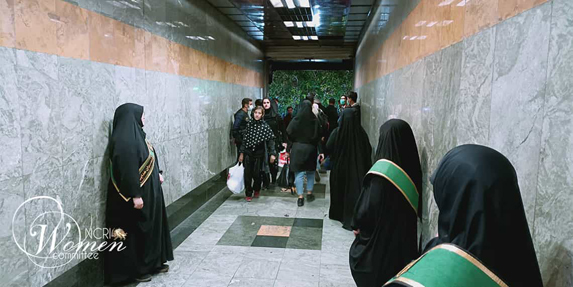
Hijab patrols
NCRI - Womens committee - 16 Nov 2023 - in Women's News
<<More Hijab Patrols Recruited in Tehran Metro Stations
Iranian state media have reported an increase in the number of Hijab
patrols in Tehran's metro stations.
On August 6, Iranian media wrote about the recruitment of 400 Hijab
patrols with a monthly salary of 120 million Rials by Tehran's
municipality.
As claimed by regime officials, the duty of these oppressive forces is
to issue verbal warnings and prevent unveiled individuals from entering
the metro, reporting them to the police in case of resistance. Paying
such high salaries to suppressive forces targeting women comes at a time
when, according to the Supreme Labor Council's decision, the minimum
monthly wage for Iranian workers in the current Iranian year of 1402 is
less than 50 million rials. Unprecedented inflation and soaring prices
have placed immense burdens on workers and laborers. Heart-wrenching
scenes of men, women, and children rummaging through garbage bins for
their meager sustenance trouble the conscience of any human being,
except for the ruling mullahs and the criminal authorities who have
abandoned all sense of humanity. In October, Armita Geravand, an
innocent 17-year-old student, lost her life after she was assaulted by
Hijab patrols in a metro wagon in Tehran. The clerical regime's
parliament has adopted a new Hijab and Chastity Bill containing 70
articles that impose draconian restrictions and punishments on women who
defy the compulsory Hijab and the businesses that allow women to do so.
The NCRI Women's Committee calls on all freedom-loving youth to stand
against these oppressive measures targeting noble women and urges
defenders of human and women's rights to condemn these actions under the
pretext of combatting improper veiling. During the 2022 uprising,
Iranian women demonstrated with slogans like <With or without hijab, we
march towards revolution,> proving that attaining gender equality and
minimum women’s rights is contingent upon overthrowing the religious
fascism ruling Iran. As Mrs. Maryam Rajavi, President-elect of the
National Council of Resistance of Iran (NCRI), has declared, <No to
compulsory religion, no to compulsory hijab, and no to compulsory
government.> >>
Source:
https://women.ncr-iran.org/2023/11/17/more-hijab-patrols/
Women's
Liberation Front 2019/cryfreedom.net 2023




